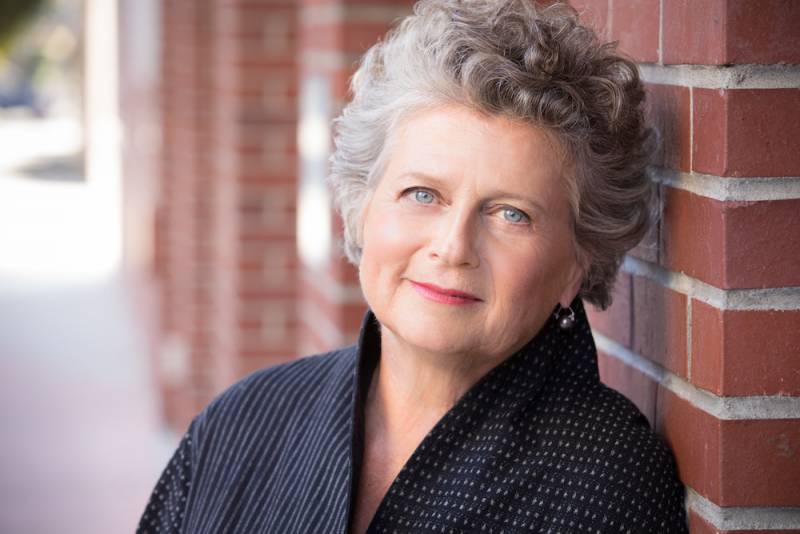When Santoya Fields thinks about the first time—and last time—she and her cast-mates performed School Girls; Or, the African Mean Girls Play at Berkeley Repertory Theatre, on March 16, what sticks out is the profound lack of clarity surrounding the circumstances.
Called in on their normally scheduled day off to rehearse and then perform the full show, which was filmed by an unscheduled camera crew, the cast and crew were told in an all-hands meeting by Berkeley Rep’s managing director, Susie Medak, that the recording was being made to “honor” their work. Though their show would never open to a live audience—Berkeley’s shelter-in-place order took effect the next day—the recording of the performance would be made available to ticketholders for a two-week time period.
It was, managing director Susie Medak tells KQED, a way to honor obligations to their expectant audience as well.
The situation was not an isolated one; theaters nationwide this year suddenly went dark, and many of them broadcast recorded versions of their closed shows. But similar to New York City theaters after 9-11, the story of School Girls; Or, the African Mean Girls Play at Berkeley Rep provides a case study in the disputes that arise when a show is forced to close due to circumstances out of the theater’s control.

‘Things Were Moving So Fast’
During the meeting on March 16, Fields, the union deputy for the cast, asked for clarification on the actors’ compensation. Medak verbally promised everyone in the room two weeks’ pay. Fields recalls that when she then asked whether those two weeks constituted extra pay beyond the four weeks specified by their Actors’ Equity-negotiated contracts, her question was dismissed.
“We only have to pay you for three days,” she remembers Medak saying, invoking the Actors’ Equity “Act of God” clause. But as Fields and Idehenre contend, force majeure was rejected in other shows that closed around the country. Nonetheless, the cast was given just 45 minutes to prepare themselves for their first, and only, full performance, which would be filmed and then broadcast, in a hastily-negotiated arrangement between Berkeley Rep, A.C.T., and Actors’ Equity.
“We were still doing blocking,” Fields’ fellow cast-mate Omozé Idehenre recalls about that day. “We’re in tech, we’re under duress because we’re in the pandemic, so we have no time to process…or to figure things out.”
“In all of my years of running a theater, I’ve just never had to do anything quite like this,” Medak recalls about that day. “Things were moving so fast at that point.”

A New Contract, and a Breach of the Old One
To add to Fields’ and Idehenre’s unease, they received an email two days later from Berkeley Rep that included a “rider” to their original contracts. This rider guaranteed payment through April 5. But the contract they had signed in February specified a four-week notice for termination, meaning they were eligible for four weeks’ worth of regular pay at termination. As they’d already been paid their contracted salary through March 22, being paid additionally through April 5 fell short of those four weeks.
Included with the new rider was a copy of an agreement between Berkeley Rep and Actors’ Equity, which specified that the theater would be allowed to record and broadcast a scheduled performance of School Girls, as well as the already-closed Culture Clash (Still) in America. The agreement itself seemed to have violated the previous contract in multiple ways—in the time of notice given to the actors before the recording, in the compensation due for the recording being made, and the fact that the show recorded was not a scheduled performance, but rather a previously unscheduled run-through of a show still in rehearsal.
According to union member Velina Brown—who pens The Business of Show Biz column for Theatre Bay Area—in order to film a show, for any purpose, a theater is contractually obligated to obtain the actors’ express permission. She also emphasizes that an actor must be notified 24 hours before a recording is made, instead of being told in a rushed meeting a couple of hours before the shoot.
Indeed, the so-titled streaming agreement with Actors’ Equity states that “best efforts” should be made to give “no less” than 24 hours. But, as Medak points out, “having a notice (issued the morning of March 16) from the governor that the building must be shut down” precluded Berkeley Rep’s ability to give that much notice. For them, filming had to happen Monday or never. And so they proceeded with the recording, and officially closed the show.

‘We Just Couldn’t Get Answers’
But for Fields and Idehenre, questions lingered around what compensation they were owed, and they reached out to Actors’ Equity for answers. It’s since become clear to them that not only did Berkeley Rep fail to adhere to the terms of their original contracts, but that Actors’ Equity failed in their mandate to enforce them. Over the course of the past few months, Fields and Idehenre researched the particulars of those contracts and the events leading up to the recording being made, in multiple conversations with Berkeley Rep, Actors’ Equity, and experts such as Velina Brown. To date, they haven’t found the results satisfactory.
“We were really trying to understand how all this happened,” Fields relates. “We went in with all these questions and we just couldn’t get answers. The union [now] recognizes that things were not done properly, but they’re still not holding themselves accountable.”


